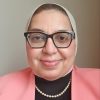Surgical pathologist Nehal Khamis, MBBCh, MSc, PhD, MHPE, MAMSE, has long had a passion for curriculum development. Khamis, co-chair of the faculty development committee of the American College of Surgeons, has worked with numerous groups in the fields of medical and surgical education and curriculum development, including the World Health Organization, Academy of Master Surgeon Educators, and Saudi Commission for Health Specialties, and her published works have been used by institutes and scientific societies in the U.S., the United Kingdom, Denmark, the Netherlands, South Korea, South Africa, and Saudi Arabia.
In 2021, Khamis added a new title to her impressive résumé: adjunct professor with the MEHP program.
At MEHP, Khamis teaches curriculum development and mentors fellows. She applies the six-step approach to curriculum development initially developed by MEHP program co-founder David Kern, MD, MPH, a professor emeritus at the Johns Hopkins University School of Medicine and the author of Curriculum Development for Medical Education: A Six-Step Approach. But she also is adding her own touch.
Khamis is working with Kern and Johns Hopkins faculty members Sean Tackett and Belinda Chen on an electronic companion guide to the text, using a set of brainstorming questions for each step of curriculum development. Instead of an open-ended question such as what is the problem that the course addresses?, Khamis introduced some sample answers that learners can consider such as inadequate knowledge regarding a health-care problem or inadequate preparation for a certain skill. The guide could be incorporated into a mobile application in the future, she says.
Johns Hopkins is the “house of tradition” when it comes to curriculum development, says Khamis, an Egyptian native, and so she has enjoyed introducing some recent trends: “My colleagues say that I’ve brought some international flavor and a little bit of innovation or creativity to the traditional approaches.”
For example, Khamis helped introduce a data template for curriculum development for simulation courses and coauthored a question-and-answer guide about entrustable professional activities, also known as EPAs, and their integration into graduate training programs that is now used as a teaching and learning resource for MEHP fellows.
“I’m proud to be part of the team for the curriculum development course,” Khamis says. “The faculty is very distinguished, and everyone brings something very bright to the discussion.” She also enjoys working with fellows, providing detailed feedback on their project submissions and helping them find relevant articles or additional other resources to build on their work.
Khamis says she has a two-part mission: to support translating medical education and surgical education efforts into better health-care outcomes, and to make health-care professionals’ lives easier.
“In many instances, we’re asking faculty in different universities or graduate training programs to develop curricula to start to adopt some new approaches, and we do not empathize with them,” she says. “It’s not true that every faculty member is a curriculum developer by default. … So what I try to do always is when I ask you to do something relevant to education, I equip you with the training and materials to make your life easier.”
Khamis was one of three keynote speakers at MEHP’s Decennial Conference in July 2021, where she presented on international work in competency-based education and offered a global perspective of medical education. From there, MEHP Director Toni Ungaretti asked her to join the faculty.

